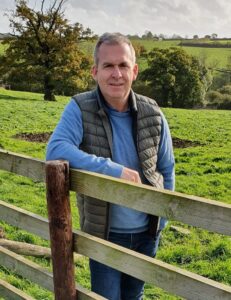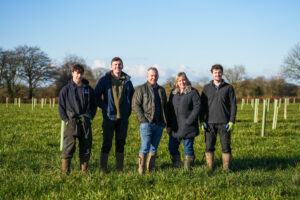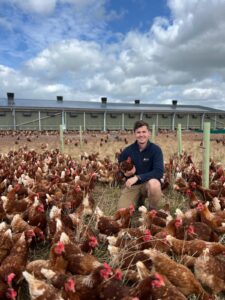Devon broiler producer Cole Farming’s holistic approach has elevated its sustainability credentials to the next level. Michael Barker reports
Some people claim that the path to success in today’s ultra-competitive marketplace is increased specialisation, but if that’s the case, then Cole Farming didn’t get the memo.
The Devon-based broiler producer runs a wide-ranging farming operation, and has shown a fearless willingness towards experimentation that has seen it implement a series of initiatives aimed at improving energy efficiency, biodiversity and environmental sustainability. Its years of work saw the company beat off stiff competition to win the Sustainable Farming Award at the 2024 National Egg & Poultry Awards in London this summer.
Director Stuart Cole is a third-generation farmer who took over the family business back in 1992, when poultry was not a major part of its operations. Originally a traditional family farm with beef, sheep and arable, Cole admits he “fell out of love with sheep and couldn’t make any money out of beef”, and for a while focused his energies on a sports equipment business that sold everything from cricket bats to rugby and hockey kits. As is often the way in life, however, it was following a chance conversation with a friend that he decided to meaningfully focus on chickens.

Starting off with a few free-range broiler sheds and then expanding from there, operations soon went hand in hand with sustainable production. “I looked at burning litter, because I thought that was a decent product that we should be doing something with, but back in 2008 there wasn’t a burner that would deal with it,” Cole recalls. “Then I went on a trip in 2009 to Denmark looking at anaerobic digestion and I got the bug from there. It took a while to go through planning to get an AD plant and we finally started building in 2013, and at a similar time we expanded our original poultry site from four sheds to six, and then seven.”
The theme was set – as the business expanded, so Cole thought about how to link his sites at Menchine and Edgeworthy Farms to create a circular system. As a result, chicken litter is now used to feed the on-site AD plant, with the subsequent woodchip fuelling biomass boilers that heat all of the poultry sheds. A wind turbine helps lower the carbon footprint further, while there are also plans to put up two 150kW arrays of solar PV on each of the sites in the new year, giving the business an additional 300kW of solar electricity.
With the energy price crisis of the past three years, it has been more than helpful for the company to have such a self-sufficient set up. “It has certainly paid dividends to be insulated, because the whole farm runs off of renewable energy,” Cole agrees. “We haven’t imported a kilowatt of electricity to the farm since the end of 2013.”
At the time of writing, the company – which supplies through Hook2Sisters – has a total of around 170,000 birds, though that can rise to as high as a quarter of a million during the busiest times of year. It has two multi-purpose sites that can produce birds from free-range to standard, as well as a higher-welfare RSPCA site supplying M&S Oakham Golds.
A family affair
Stuart Cole runs the business with the support of his three sons, Greg (25), Elliot (23) and Jacob (20). Greg runs the new egg business Woodcott Layers (see box), while Elliot joined the company this year having graduated in agricultural business from Reading University and is now a poultry manager at the Edgeworthy site. Jacob has just started a three-year course studying agriculture in Cirencester and will no doubt play his full part in future. A true family outfit, Stuart’s wife Miranda also helps out in the office and around the site as needed.

Despite being chiefly a poultry operation, Cole Farming is a diverse affair. The business finishes around 400 cattle a year at Edgeworthy, and has a small Aberdeen Angus suckler herd. Some 460 acres of land between Menchine and Edgeworthy Farms is also used to grow a mixture of barley, wheat, grass, maize and oats for either animal feed or feed stock for the biogas plant. “I think farming has moved away from specialisation,” says Cole. “Thirty, 40, 50 years ago, everybody did a bit of everything, and then the industry went through a phase of specialisation, whether it was arable, beef or poultry. And while I think that to be resilient you still need to specialise, you need to specialise in multiple facets.”
The Cole philosophy is about taking control of as much of the farming process as possible. In recent times the company has put in a pellet mill to produce its own pellets and use them as poultry bedding, which Cole says gives an excellent litter that is extremely absorbent in the poultry sheds, and then produces more gas in the biogas plant. Those pellets are used under the cattle as well, keeping them drier and using less straw.
The business produces 90% of its own fertiliser, and has a methane tractor and an electric quad bike and van as every area of the operation gets attention. “We’re constantly moving towards being a more circular business,” Cole says, adding that the company has also implemented a range of biodiversity initiatives such as planting trees and arable lays under the SFI scheme.
The next step includes getting closer to the end user and finding ways to sell more product direct, albeit on a small scale to start with. “As anyone will tell you, there are too many in the supply chain taking margins, and there’s very little left for a farmer at the end of the day,” Cole says. “So the more steps we can take out and the more margin we can hold onto, the more resilient we believe we’re going to be.”
Given its wide range of sustainability commitments, it’s unsurprising that Cole Farming has been selected for M&S’ Farm of the Future programme, which helps identify and implement practical activities that will help farms achieve net zero. It also aims to bring in advice and mentoring from sustainability experts, with knowledge shared across M&S’ supply base and the wider industry. It’s early days for what is a long-term initiative, but it adds to some of the ongoing work the company is doing with 2 Sisters, such as an Innovate UK project with Flox and Flybox that sees a camera system installed for chicken monitoring and weighing, and black soldier fly larvae used for welfare improvements.
Taking control
Cole says the Farm of the Future development will help measure and demonstrate the company’s considerable recent progress, which feels like the natural next step in its evolution. “To be honest, we’ve done a whole load of things over the last few years,” he explains. “We’ve dug three ponds, we’ve planted 3,000-4,000 trees and done various other things off our own back, because it seemed like the right thing to do and it fitted with what we were doing on the farm. But we’ve never tried to measure or have any external adjudicator look at what we’re doing and say we are heading in the right direction. Our gut feeling is that we are heading towards net zero, but we haven’t tried to measure it yet. We’ve been too busy with our head down, doing different things that we feel is right, but we think it’s time to take a step back and have a look at what we’ve achieved.”

Cole Farming is not a business that likes to stand still, and there’s a constant sense of wanting to retain control of its own destiny. Rather than buying in off-the-shelf technology, the company is currently developing its own bespoke data collection system, allowing it to keep close tabs on all of its poultry sites. “The beauty of it is we will own our own data,” Cole says. “There are systems being developed, but they tend to be top down, not bottom up. They’re designed for what data the processors or retailers want to collect, and some of it might be useful to a farmer, but we prefer to design an app that collects all the data that a farmer wants. That would include the facility to push that data up or down the chain as required rather than us entering data into somebody else’s proprietary software that we have no control over.”
It all sounds like a lot of work, and Cole says he is grateful to have his sons coming into the business to pick up some of the slack. “It’s quite good having Greg and Elliot back to take on some of the work,” he says. “I couldn’t do it all otherwise, and I wouldn’t have pushed on and done all this without the prospect of help. For us, it’s really about making sure that the family farm stays viable.”
With sustainability at the heart of everything the company does, and Cole insisting that the investments also make economic sense, it looks likely that the farm will be viable for a long time to come.
Cracking the egg market
Cole Farming only moved into egg production in January this year, with eggs from 12,000 brown hens being supplied to St Ewe.
The egg side of the business, under the name Woodcott Layers, is being run by Greg Cole, who joined the business four years ago and initially took on responsibility for the beef finishing unit before switching to the poultry side.
Completely off grid, Woodcott Farm was developed from scratch with the aim of being as sustainable as possible and maximising hen welfare. It features a multi-tier system within the shed that allows hens to express natural behaviours, and some 1,500 trees planted within the range areas.
The shed is powered by 60kW of solar panels and batteries, with litter from the birds taken to the Menchine Farm biogas plant to produce renewable energy. All of the water for the farm comes from an on-site borehole.


